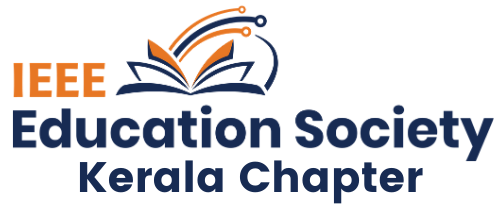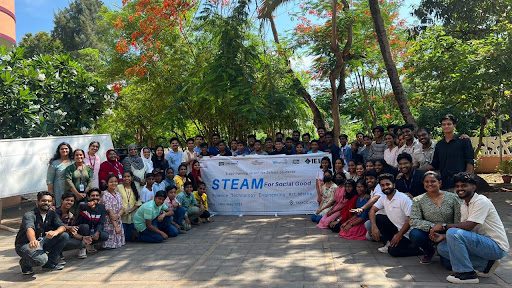

IEEE Education Society, Kerala Chapter in association with IEEE Kerala Section SIGHT hosted the STEAM for Social Good from September 3rd to 18th, 2023. It was a ten-day after-school STEAM coding camp followed by a two-day action-filled Makeathon on applying a design thinking approach towards UN Sustainable Development Goals. This event was funded by the IEEE TryEngineering STEM Portal and was supported by AMMACHI Labs. The coding camp and Makeathon were conducted in a peri-urban school namely Amrita Vidyalayam, Kochi, Kunnumpuram in Kerala.
The children were taught the basics of coding, and technologies like app development and IoT along with sessions on UN Sustainable Development Goals. For the first ten days of the coding camp, the participants learned to research and deepen their understanding of wicked societal problems and engineer local solutions for global issues through the process of designing, innovating, and inventing practical solutions. This was orchestrated in an engaging approach that aimed at enriching their inherent creative talents. During the final 2-day Makeathon, using computing skills they learned in the preceding ten days, the children came up with creative solutions to the UN global goals challenge.
Day 1 – Forenoon session
The forenoon of the training program started with the children playing a VR game where they interacted with a robot to build a 3-dimensional toy. Then they moved on to learn about sustainability and UN Sustainable Development Goals (SDGs). The morning session finished with a thrilling and engaging quiz game on UN SDGs.
Day 1 – Afternoon session
Children were introduced to BBC Micro:Bit and Microsoft Makecode. At the end of the day children had fun playing once again with the VR Headset.
Day 2 – Morning session
Day 2 started with children working on creative problem solving. They had to propose a solution to save a mother eagle struggling with a broken wing, helpless to feed or defend her brood in the nest perched high above in a tree which they found when they went on a hiking camp in the forest. In their backpack, they only had hiking boots, a water bottle, a 3-foot-square towel, a Leatherman tool, a Swiss Army knife, a basic first-aid kit, a roll of duct tape, and two four-person tents of ripstop nylon with the bungee cords and metal tent pegs that go with them. Children drew their solutions to this problem statement on a chart paper and presented their creative rescue solution to the class.
Day 2 – Afternoon session
Children continued tinkering with BBC Micro: bit. They learned about event handling with buttons and how accelerometers work. They made virtual dice and a digital handheld counter to practice by doing. They wrapped up the day by creating an air quality monitoring station using a dust sensor.
Day 3 – Morning session
Children learned more about sensors and built applications using them. They built an environmental noise pollution monitor to reduce the physiological and psychological ill effects of environmental noise pollution. They built a weather station to monitor the ambient temperature and humidity in real-time.
Day 3 – Afternoon session
Participants experimented with the STEAM kit and developed an automatic irrigation system. The system could analyze the soil’s moisture quantity and develop a capable system for irrigating the land.
Day 4 – Morning session
Day 4 was particularly filled with lessons on radio communication between two Micro bits. Also, as a side quest, the children developed an intruder detection system that could identify intrusion attempts of any type.
Day 4 – Afternoon session
Children learned more about distance sensing using ultrasonic sensors and gained insight into its application. Further, a detailed overview of radio communication was also part of the session that followed.
Day 5 – Session
A mock makeathon was conducted as part of the session. During this mock makeathon a demo prototype was developed on various SD Goals. This helped the children to gain hands-on exposure on product development.
Online session Sep 13 – Sep 16
Through a series of online sessions, children were given training on IoT Development and App Development. These sessions were curated specifically to ensure maximum output from the students.
2-day Makeathon
Children were given an opportunity to develop projects to address the UN Sustainable Development Goals. For this, a makeathon was arranged with mentors to support the students. A total of 50 students in 10 teams participated in the makeathon developing innovative products.

IEEE and its members inspire a global community through highly-cited publications, conferences, technology standards, and professional and educational activities.
Copyright © 2024 IEEE Education Society Kerala Chapter